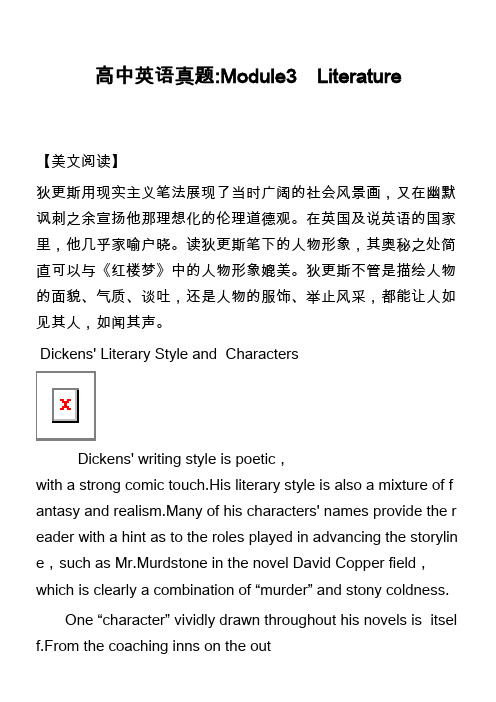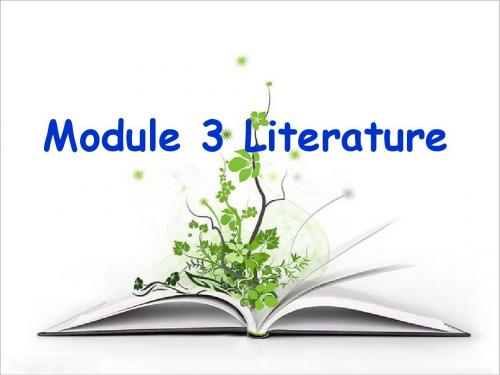高中英语Module3Literature.SectionⅠIntroduction,ReadingandVocabulary课件外研版选修7
- 格式:ppt
- 大小:3.38 MB
- 文档页数:43

高中英语真题:Module3 Literature【美文阅读】狄更斯用现实主义笔法展现了当时广阔的社会风景画,又在幽默讽刺之余宣扬他那理想化的伦理道德观。
在英国及说英语的国家里,他几乎家喻户晓。
读狄更斯笔下的人物形象,其奥秘之处简直可以与《红楼梦》中的人物形象媲美。
狄更斯不管是描绘人物的面貌、气质、谈吐,还是人物的服饰、举止风采,都能让人如见其人,如闻其声。
Dickens' Literary Style and CharactersDickens' writing style is poetic,with a strong comic touch.His literary style is also a mixture of f antasy and realism.Many of his characters' names provide the r eader with a hint as to the roles played in advancing the storylin e,such as Mr.Murdstone in the novel David Copper field,which is clearly a combination of “murder” and stony coldness. One “character” vividly drawn throughout his novels is itsel f.From the coaching inns on the outskirts of the city to the lower reaches of the Thames,all aspects of the capital are described over the course of his bo dy of work.Dickens is famed(著名的) for his description of the hardships of the working class,his intricate(错综复杂的) plots,and his sense of humour.But he is perhaps most famed for the characters he created.His novels created characters to whom r eaders could relate.Dickensian characters-especially their typical names,such as Oliver Twist,Pip,David Copperfield and so on-are among the most memorable in English literature.【诱思导学】1.What's Dickens' writing style?_______________________________________________2.What did Dickens describe most in his novels?_______________________________________________【答案】 1.Poetic and a mixture of fantasy and realism.2.The hardships of the working class in old London.Period ⅠPreviewing(教师用书独具)●教学目标本课时主要是学生通过对学案所给出的内容的学习,了解本课文中所出现的词汇,初步了解课文以及相关的背景知识,为下一堂课对课文的全面理解起到一个铺垫作用。


Module 3 MusicSection Ⅰ Introduction & ReadingPre-readingFolk songs are the songs that are made up by common people. Many folk songs tell about heroes, robbers or young girls. Others, like OldMacDonaldHadaFarm, are just for fun. Some folk songs are about the kinds of work that people do. Christmas carols (圣诞颂歌) are folk songs, and so are the patriotic (爱国的)songs of many countries.Every country has its own folk songs. Most of these songs were made up long ago, and people have been singing them for hundreds of years.Of course, in China, we also have a long and honoured tradition of folk songs and folk singers. Like all folk songs, they come from the ordinary people and tell of things in ordinary lives. There are three main kinds of Chinese folk songs: Hao Zi, Xiao Diao and Shan Ge.Hao Zi is sung by males. Shan Ge is sung by two people,while Xiao Diao, with its beautiful tone, is usually sung by girls.And in this module we’ll learn something interesting and important about some foreign musicians. We’ll be impressed by their special experiences and talent in music. Well, let’s begin.Section_ⅠIntroduction & Reading —Prereading[原文呈现] [读文清障]Joseph Haydn(1732-1809)was an Austrian composer①and is known as②“the father of the symphony③”. Other composers had written symphonies before Haydn, but he changed the symphony into④ a long piece for a large orchestra⑤.He was born in a village in Austria⑥, the son of a peasant⑦. He had a beautiful singing voice⑧. After studying music in Vienna⑨,Haydn went to work at the court○10 of a prince ⑪in eastern Austria, where he became director⑫ of music. Having worked there for 30 years⑬, Haydn moved to London, where he was very successful.Wolfgang Amadeus Mozart (1756-1791) was a composer, possibly the greatest musical genius⑭ of all time⑮. He only lived 35 years and he composed⑯more than 600 pieces of music.Mozart was born in Salzburg, Austria. His father Leopold was a musician⑰ and orchestra conductor⑱. Wolfgang had musical⑲talent⑳from a very early age. He learned to play the harpsichord○21 when he was four, he started composing music when he was five, and when he was six, he played the harpsichord in a concert for the Empress○22 of Austria.By the time he was 14, Mozart had①composer/kəm’pəʊzə/n.作曲家②be known as作为……而著名③symphony/’sImfəni/n.交响乐;交响曲;交响乐团④change ...into ...把……转变成……⑤orchestra/’ɔːkIstrə/n.管弦乐队(团)⑥Austria/’ɒstriə/n.奥地利⑦peasant/’peznt/n.农民the son of a peasant是he的同位语。



Module 3 LiteratureWilliam Shakespeare is one of the most famous writers in the world. His father was an important man in the town so Shakespeare had a good upbringing (教养). Shakespeare probably went to school but not university. He got married when he was 18 to Anne Hathaway and the couple had three children.Shakespeare wrote 38 plays and 154 sonnets (十四行诗). He began working in his hometown of Stratford, but by 1592 he was writing in London. He became rich enough to buy a house in the capital and one in Stratford. He wrote sad famous stories, like Romeo and Juliet, funny stories, romantic stories and stories about historical figures such as Julius Caesar.Shakespeare died on his birthday in 1616, almost 400 years ago. But why are his works still popular today? His works looked at common human themes, such as power, ambition and love. These themes are as much a part of human nature today as they were all those years ago and are the themes we see in modern soap operas and Hollywood films. Even though his theatre, the Globe, was burned down in 1613, it was rebuilt in London in 1997 and you can still see his plays performed there today.Shakespeare's influence on the English language can still be felt today. We talk about “fair play”, meaning honest behavior but this phrase was first used by Shakespeare. And it was Shakespeare who came up with the expression to disappear “into thin air” which we still use today when we lose something.Shakespeare's works have been translated into every major language in the world. And perhaps we'll still be as fascinated by his works 400 years from now as we've been for almost the last 400.根据短文判断正(T)误(F)1.William Shakespeare only wrote a lot of funny stories in his life.( F ) 2.William Shakespeare's works are still often performed in his theatre named The Globe today.( T )模块核心素养导航Module 3 Literature SectionⅠIntroduction & Reading and SpeakingⅠ.重点单词1.scene n. 场景;场面2.feed v. 喂养;为……提供食品3.appetite n. 胃口;食欲4.whisper v. 低声地说;耳语5.support n. 支撑物6.seize v.抓住7.hang v. 绞死;吊死8.lock v. 用锁锁(起来)9.reward n. 酬谢;奖赏;赏金10.novelist n. 小说家→novel n. 小说11.cruel adj. 冷酷的→cruelty n. 残酷12.desperate adj. 绝望的 (with);非常需要的(for)→desperately adv. 绝望的→desperation n. 绝望 (in)13.healthy adj. 健康的→health n. 健康(状况)14.astonishment n. 震惊;惊讶→astonish v. 使震惊;使惊讶→astonished adj. 震惊的;惊讶的(at)→astonishing adj. 令人惊讶的15.serve v. 端上(饭菜等)→service n. 服务16.eager adj. 热切的;渴望的→eagerness n. 热切;渴望Ⅱ.核心短语1.in_astonishment 惊讶地;吃惊地2.stare_at 凝视,盯着看3.hold_on_to 抓紧,握紧4.disagree_with 不同意5.in a...voice 用……声音(说),……声地6.hit sb.on the head 打某人的头7.pick out 挑选出8.put up 张贴;搭建9.be desperate with 因……而绝望10.be cruel to 对……残酷Ⅲ.经典句式1.The bowls never needed_washing,_as the boys cleaned them with their spoons, trying to eat every bit of soup.从来不需要刷碗,孩子们会用勺子把汤碗清理得一干二净,试图吃掉每一点汤。
Module 3 LiteratureOliver Twist is a young orphan.His mother, not known to anyone in the town, died right after giving birth to him, and he was sent to the orphanage.When he turned nine, he was sent to the workhouse.One day, Oliver asked for more, so Mr Bumble sent him to an undertaker (殡仪员).It was not great there either, and Oliver ran away.Oliver walked towards London, where he met a boy named Jack Dawkins.He introduced Oliver to Fagin, who trained kids to be thieves.One day, Oliver went out with Jack and a boy named Charley Bates.Oliver saw them steal the handkerchief of Mr Brownlow.He was arrested for theft by Mr Brownlow mistakenly.Luckily, the bookseller proved Oliver was innocent.At last Mr Brownlow took Oliver home.Later, Fagin ordered his lover Nancy to take Oliver back and she succeeded.Oliver was forced to break into a house and steal things with Bill Sikes, but Oliver was shot.Sikes escaped, leaving Oliver behind.Oliver had to go back to the house, where the kind owner, Mrs Maylie, and her niece Rose, decided to protect him.After Oliver recovered, they planned to take him to see Mr Brownlow, but Oliver was nowhere to be found.Meanwhile,Fagin and his partner Monks didn't give up finding Oliver.Nancy, overhearing (偷听) Fagin and Monks' conversation, went to Rose to tell her that Monks was Oliver's halfbrother, who had been trying to get Oliver's inheritance (遗产).Rose and Mr Brownlow decided to find Monks and they met Nancy again on London Bridge, but Nancy was followed by Noah, a boy sent by Fagin.Noah reported everything to Fagin.Then Fagin told that to Sikes.Sikes killed Nancy.Finally, Mr Brownlow found Monks who admitted everything that he had done.Sikes was on the run, and accidentally hung himself in falling off a roof.Fagin was arrested.Oliver, Mr Brownlow, and the Maylies ended up living a peaceful life.Section ⅠIntroduction & Reading —Prereading[原文呈现][读文清障]Oliver Asks for MoreThe room ①in which the boys were fed② was a large stone hall, with a large pot③at one end④. The warden⑤, helped by two women⑥,served⑦ the soup from this pot at meal times. Each boy was allowed one bowl of soup and no more, except on special holidays when he was given another 60 grams of bread⑧. The bowls never needed washing⑨, as the boys cleaned themwith their spoons, trying to eat every bit of⑩ soup⑪. This never took very long, as the spoons were almost as large as the bowls. When they had cleaned their bowls in this way⑫,they would sit staring at⑬ the pot with eager⑭ eyes⑮, as if they wanted to eat it. Boys usually have excellent appetites ⑯. Oliver Twist and his companions⑰ slowly starved for three months until finally, they became quite wild with hunger⑱.①in which为“介词+关系代词”结构,in which the boys were fed是定语从句,修饰先行词the room。